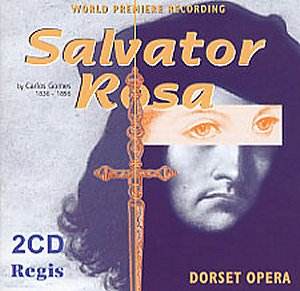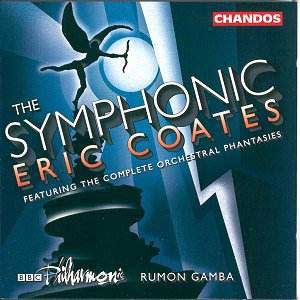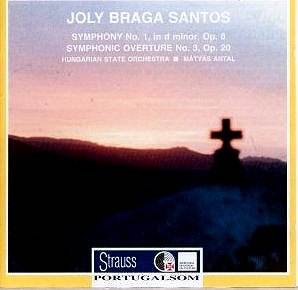 Composer: Carlos Gomes
Composer: Carlos Gomes
Works: Salvator Rosa
Performers: Isabella – Lisa Livingston (soprano), Salvator Rosa – Fernando del Valle (tenor), Gennariello – Andrea Baker (mezzo soprano), Masaniello – Michael Gluecksmann (baritone), Il Conte de Badajoz – Christopher Lemmings (tenor), Duca d’Arcos – Michail Milanov (bass), Fernandez – David Curry (tenor), Corcelli – Jürgen Frantz (bass), Fra Lorenzo – Martin King (bass), Bianca – Caroline Dowd-Higgins (soprano), Dorset Opera Chorus, Dorset Opera Orchestra, Patrick Shelley (conductor)
Recording: 11th and 12th August 2000
Label: REGIS Forum FRC 9201 [2CDs: 142.07]
Carlos Gomes, a prominent figure in the 19th-century operatic landscape, often finds himself overshadowed by the likes of Verdi and Puccini, even though his work embodies a rich tapestry of influences from both his Brazilian heritage and his Italian training. “Salvator Rosa,” premiering in 1874, is a compelling opera that blends dramatic narrative with lush, albeit occasionally inconsistent, musical textures. The libretto by Antonio Ghislanzoni provides a fertile ground for Gomes to explore themes of patriotism, love, and conflict, as exemplified in the turbulent life of the titular painter and poet.
The recording by Dorset Opera offers a unique glimpse into this lesser-known work, capturing the energy of live performance with all its attendant strengths and weaknesses. Under the baton of Patrick Shelley, the Dorset Opera Orchestra presents a vibrant interpretation, which, despite some rough edges, manages to evoke the operatic tradition of its time. The orchestra’s engagement with the score, particularly during the climactic second act finale, highlights Gomes’s penchant for dramatic orchestration. The offstage trumpet and chorus create an effective sense of grandeur, reminiscent of Verdi’s expansive style, yet there are moments where ensemble balance falters, revealing the amateur nature of some of the performers.
Vocal performances vary across the cast. Lisa Livingston’s Isabella stands out with her dramatic intensity and vocal prowess, delivering a top C that resonates with both power and clarity. In contrast, Fernando del Valle’s portrayal of Salvator Rosa is marked by inconsistency; while he offers thrilling moments, his top notes often lack the security and focus that the role demands. This inconsistency, particularly in a role as central as Salvator, detracts from the overall impact of the performance. Andrea Baker’s Gennariello, a trouser role, shines brightly, her vibrant tone and assured delivery providing a refreshing contrast to some of her colleagues. Michael Gluecksmann’s Masaniello, while capable of some stirring moments, often resorts to a barking delivery when the character’s emotions peak, undermining the lyrical potential of Gomes’s writing.
The sound quality of the recording is generally commendable, capturing the immediacy of live performance, though some vocal balances—especially from the amateur chorus—occasionally disrupt the listening experience. The acoustic might also contribute to some muddy textures in the orchestral sound, particularly during the more intricate passages where Gomes’s orchestration can be thick with counterpoint. Yet, the palpable excitement of a live audience, underscored by their reactions, provides a spirited backdrop that further engages the listener.
While Gomes’s music exhibits moments of brilliance, such as the vivid duet between Salvator and Masaniello, it is also punctuated by sections that feel formulaic or lacking in depth, occasionally echoing other composers’ styles rather than forging a distinctive voice. The influences of Verdi are undeniable, but Gomes’s unique perspective as a Brazilian composer remains a vital element of his work. The final act, with its tragic resolution and poignant moments, encapsulates the opera’s emotional core, though it leaves one wishing for a more cohesive delivery throughout.
The Dorset Opera’s recording of “Salvator Rosa” serves as an invaluable contribution to the understanding of Gomes’s oeuvre, showcasing both the opera’s strengths and its limitations. The enterprise of reviving this work, coupled with the recording’s vibrant immediacy, makes it a noteworthy addition to the catalog of lesser-known operas. Its historical significance and the sheer artistry of certain performances ensure that Gomes’s voice, though occasionally overshadowed, continues to resonate within the operatic canon.



